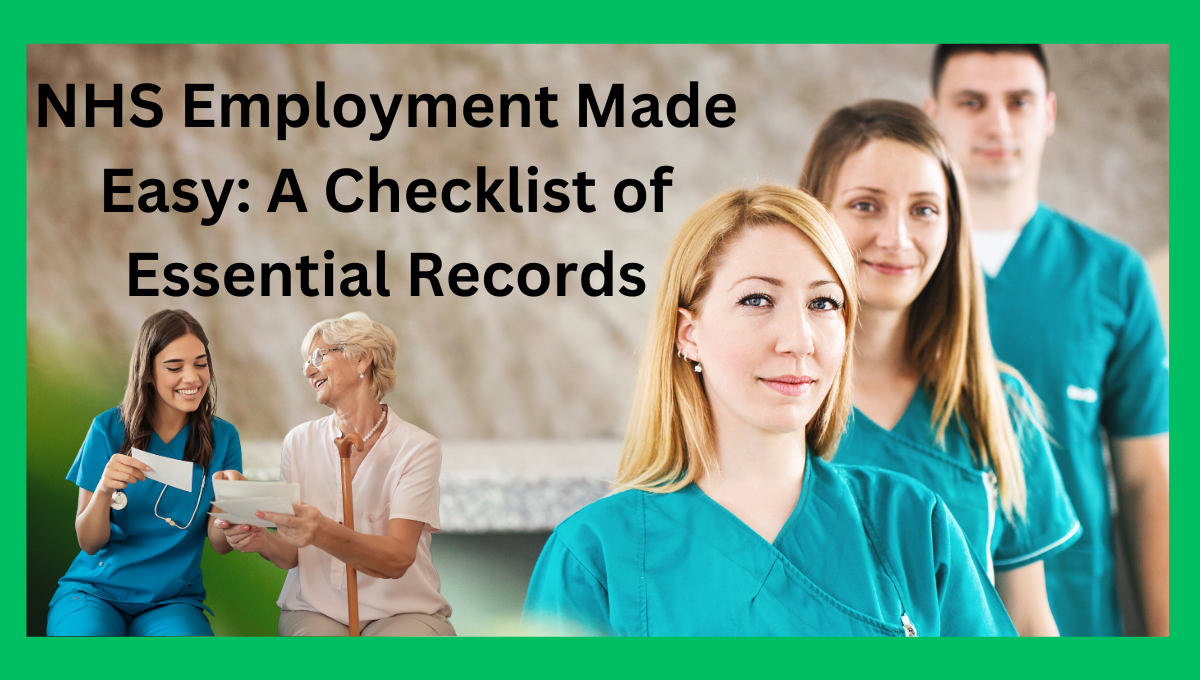Necessary Records for NHS Employment Applications
It takes considerable planning to land a job with the National Health Service (NHS), especially when it comes to obtaining the required paperwork. When applying for a job with the NHS, you must highlight your skills, background, and fit for the position. We have put together a thorough guide outlining the necessary paperwork for NHS job applications in order to guarantee a smooth application procedure.
The Significance of Precise Documentation
Having the right paperwork shows that you are prepared and professional; therefore, it’s not simply a formality. Submissions that are incomplete or inaccurate may cause your application to be delayed or rejected. You may greatly increase your chances of success by being proactive and well-organized.

Important Records Needed for NHS Employment Applications
- Identity Verification
Identity verification is a basic prerequisite. A government-issued photo ID must be one of the two types of identification that the NHS normally seeks.
Accepted photo identification: driver’s license or passport
Residence Permit with Biometrics
Secondary Identification: Utility Bill (within the last three months) and Birth Certificate
Statement of Bank
Verify that every document is up to date and corresponds with the information on your application.
- The UK’s Right to Work
Candidates must present proof of their eligibility to work in the UK. For non-UK citizens, this frequently consists of:
A current work permit or visa
Certificate of Sponsorship for Biometric Residence Permit (if applicable)
UK nationals can present proof of National Insurance together with their passport or birth certificate.
- Academic Credentials
Your academic credentials attest to your suitability for the position. Incorporate:
Verified copies of diplomas or degrees
Transcripts of academic work
Professional qualification certificates
If the role requires specialized expertise (such as a medical or nursing degree), make sure your credentials meet NHS requirements.
- Professional Licensure and Registration
It is required to register with an appropriate professional body for clinical roles. Depending on your line of work, this could involve:
General Medical Council (GMC) Registration Health and Care Professions Council (HCPC) Certificate Nursing and Midwifery Council (NMC) Pin
Make sure your practice is unrestricted and provide documentation of your current registration.
- References and Work History
A thorough work history shows your dependability and experience. Incorporate:
A comprehensive resume customized for the NHS position
references from prior employment (at least two)
Contact information for the referees
Make sure your references are current and professional. References from managers or superiors are frequently preferred by the NHS.
- Check of the Disclosure and Barring Service (DBS)
A DBS check is necessary for employment in the healthcare industry to verify your suitability to work with vulnerable populations. Get the following ready:
filled-out DBS application
Documents proving identity
Receipt of payment (if applicable)
Make sure that your current DBS certificate satisfies the standards of the position and is, if necessary, on the Update Service.
- Clearance for Occupational Health
Having a health clearance guarantees that you are fit for the position. Send in:
filled-out health questionnaire
Records of immunizations (e.g., MMR, TB, Hepatitis B)
Any extra examinations or immunizations that the NHS requests
- Proof of Address You must present current documentation attesting to your residential address. Documents that are acceptable include:
Bill for utilities (from the previous three months)
Bank statement and council tax bill
Make sure the address and name on these documents match the one on your application.
- Statement of Support
One of the most important components of your application is a strong supporting statement. Take advantage of this chance to:
Emphasize your abilities and background.
Describe why you are the best person for the job.
Show that you comprehend the values of the NHS.
For optimum effect, customize the sentence to the particular job description.
- Results of Language Proficiency Tests
You could be required to present proof of your ability if English is not your first language. Tests that are accepted include:
The Occupational English Test (OET) and the International English Language Testing System (IELTS)
Make sure your scores satisfy the NHS’s minimum standards for the position.
- Certificates of Training
Provide certifications for any relevant training you have completed, such as:
Advanced Cardiovascular Life Support (ACLS) and Basic Life Support (BLS)
Handling by Hand and Infection Prevention
These credentials show your dedication to professional growth and improve your application.
- Photos the size of a passport
Passport-sized photos may be necessary for identification in certain NHS positions. Make sure these fulfill the necessary requirements (appropriate proportions, clear background). - Bank Information
Give your bank account details for payroll purposes, such as:
Sort code for the account number
Name of the bank
This will be asked for after the employment offer is confirmed.
Advice for Document Organization
Make a Checklist: Make sure you have all the necessary paperwork by using a checklist.
Both digital and hard copies: Get physical copies and scanned versions of every document ready.
Clearly label the files: Indicate your name and the type of document (for example, “JohnDoe_Passport”) on the label of each digital submission.
Check the Expiration Dates: Verify the validity of all documents, including identification and licenses.
Common Errors to Steer Clear of
submitting documents that have expired
Information that is inconsistent among forms
missing the due dates for submitting documents
Digital copies that are illegible or poorly scanned
To stay clear of these dangers, attention to detail is essential.
In conclusion
Applying for a job with the NHS gives you the chance to work for a reputable healthcare organization that prioritizes patient care. You will stand out as a professional applicant if you make sure that all of your documents are correct, comprehensive, and current. You’ll be ready to advance in your healthcare job if you maintain your organization and thoroughness.


1 thought on “NHS Employment Made Easy: A Checklist of Essential Records”